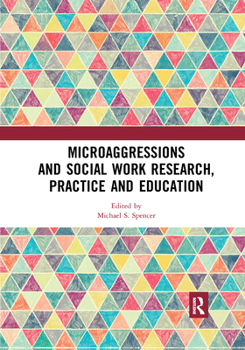Microaggressions and Social Work Research, Practice and Education
While blatant forms of racism and discrimination have largely been condemned in our society, systematic oppression and racism can be manifested in a less obvious form, as 'microaggressions'. The term, originally developed in the 1970s by Chester Peirce to describe the ways in which Black people were "put down" by their White counterparts, has since been expanded to describe both conscious and unconscious acts that reflect superiority, hostility, and racially inflicted insults and demeanors to marginalized groups of people.
This book provides a platform for social work researchers, scholars, and practitioners to present their research, ideas, and practices pertaining to ways in which microaggressions and other subtle, but lethal forms of discrimination impact marginalized populations within social work and human services. Contributors discuss the impact of microaggressions in social work as they relate to race; gender and gender expression; sexual orientation; class; and spirituality. The book also examines curriculum, pedagogy, and the academic climate as targets for intervention in social work education. This book was originally published as a series of special issues of the Journal of Ethnic and Cultural Diversity in Social Work.





